高中英语外研版选修6 Module 1 Small Talk Reading and listening课件 18张
文档属性
| 名称 | 高中英语外研版选修6 Module 1 Small Talk Reading and listening课件 18张 |
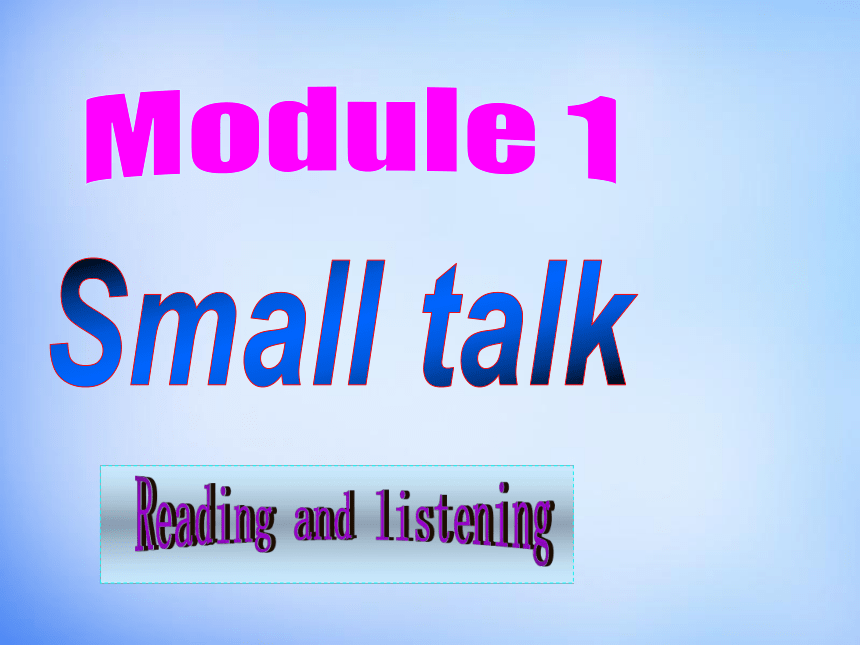
|
|
| 格式 | zip | ||
| 文件大小 | 152.7KB | ||
| 资源类型 | 教案 | ||
| 版本资源 | 外研版 | ||
| 科目 | 英语 | ||
| 更新时间 | 2019-02-19 00:00:00 | ||
图片预览

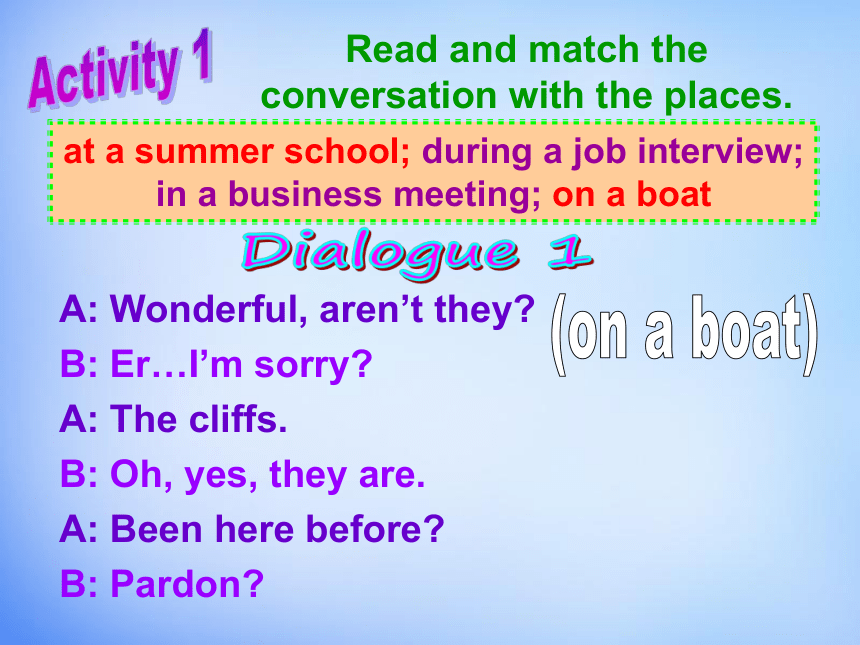
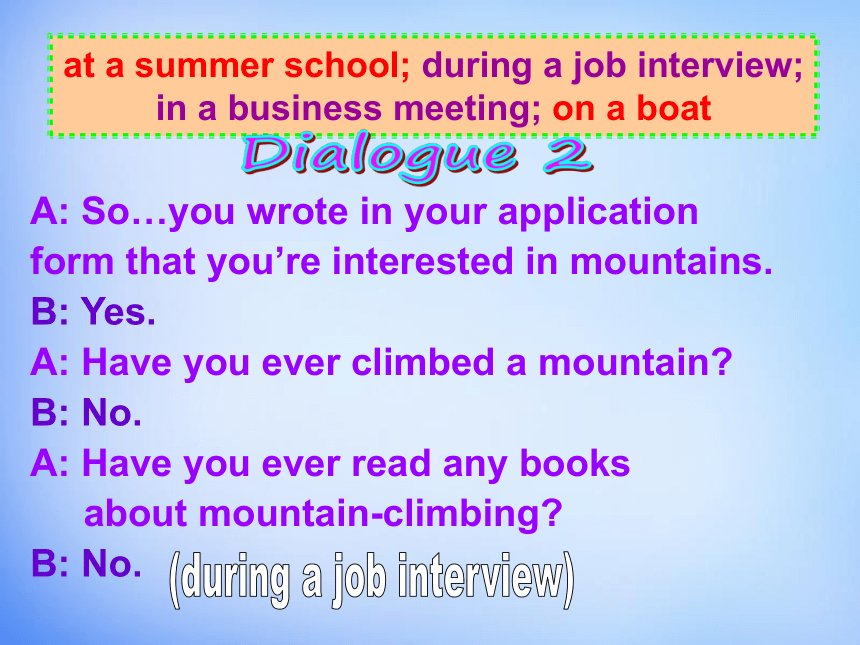

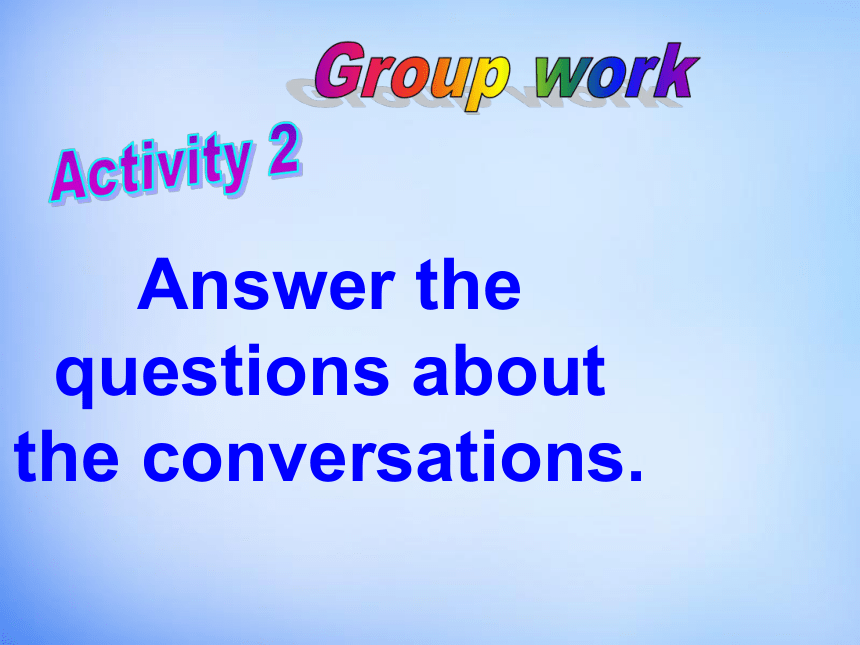
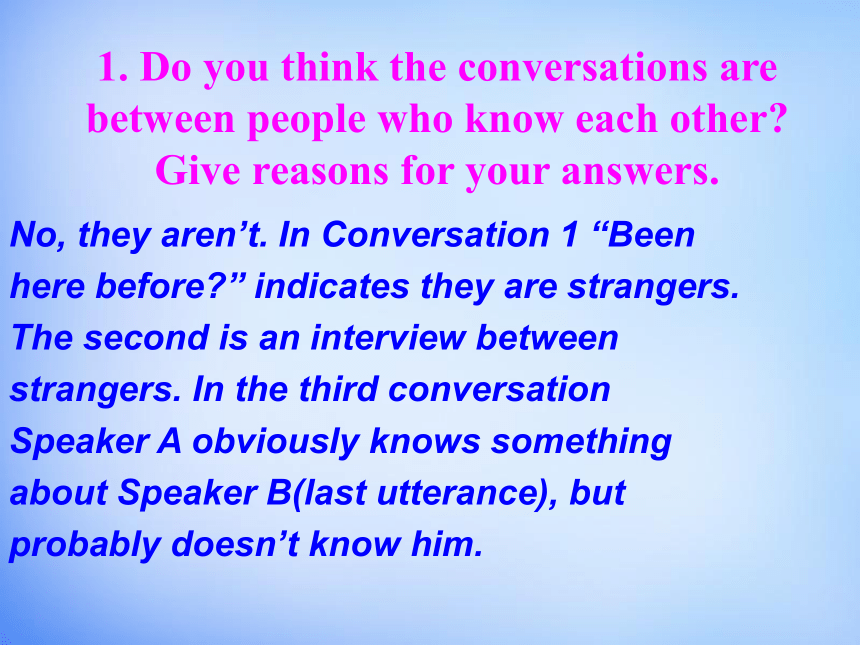
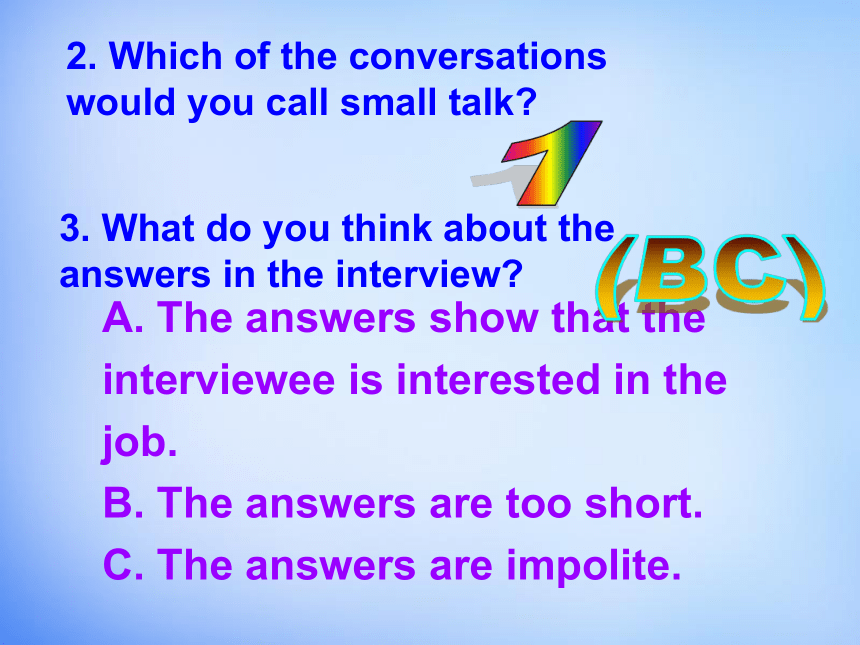
文档简介
课件18张PPT。Module 1Reading and listening ____ ____Read and match the conversation with the places.at a summer school; during a job interview; in a business meeting; on a boatA: Wonderful, aren’t they?
B: Er…I’m sorry?
A: The cliffs.
B: Oh, yes, they are.
A: Been here before?
B: Pardon?Activity 1Dialogue 1(on a boat)A: So…you wrote in your application form that you’re interested in mountains.
B: Yes.
A: Have you ever climbed a mountain?
B: No.
A: Have you ever read any books
about mountain-climbing?
B: No.at a summer school; during a job interview; in a business meeting; on a boatDialogue 2 (during a job interview)at a summer school; during a job interview; in a business meeting; on a boatDialogue 3A: When did you arrive?
B: Yesterday.
A: Nice journey?
B: Very nice.
A: Did the immigration people ask to see your visa?
B: I didn’t need to get a visa.
A: Really? Why not?
B: Because I was born here.
A: Oh yes, of course!(at a summer school)Answer the questions about the conversations.Group workActivity 21. Do you think the conversations are between people who know each other? Give reasons for your answers.No, they aren’t. In Conversation 1 “Been here before?” indicates they are strangers. The second is an interview between strangers. In the third conversation Speaker A obviously knows something about Speaker B(last utterance), but probably doesn’t know him.2. Which of the conversations would you call small talk?3. What do you think about the answers in the interview?A. The answers show that the interviewee is interested in the job.
B. The answers are too short.
C. The answers are impolite.1(BC)Listen to the whole of the first conversation and answer the questions.Do the people both speak English as a first language? No, they don’t.Activity 3Why did the woman have problems understanding what the man was saying?She needed to get used to his voice.How did the man help her to understand him better?He spoke slowly and repeated things.M: Wonderful, aren’t they?
F: Er…I’m sorry?
M: The cliffs.
F: Oh, yes, they are.
M: Been here before?
F: Pardon?
M: I said: Have you been to England before?
F: Sorry, I couldn’t hear what you said. No, this is my first vist.
M: You must be very excited.
F: Yes, I am. Very excited.
M: Staying long?Listening textF: I’m really sorry. I didn’t catch what you said.
M: Sorry, my fault. I said: Are you going to stay in England for a long time?
F: Oh. No. Just three weeks.
M: Language course?
F: Yes.
M: Going anywhere nice?
F: I’m going to study in Oxford.
M: Oxford?
F: Yes.M: Lovely place. Go there a lot.
F: Sorry? Could you repeat what you said?
M: I go there a lot.
F: Oh.
M: Well, have a good time.
F: Thank you. Er…excuse me?
M: Yes?
F: You needn’t have spoken so slowly. I just
needed a few seconds to get used to your voice.
M: Oh.
F: So it wouldn’t have been a problem.Choose the correct endings to the lines from the conversation.Sorry, I couldn’t ______.
A. hear what you said
B. understand what you saidActivity 4 AI didn’t ______.
A. like what you said
B. catch what you saidBCould you ______?
A. repeat what you said
B. explain what you saidAYou needn’t have ______.
A. spoken to me
B. spoken so slowlyBI just needed a few seconds ______.
A. to get used to your voice
B. to understand your voiceA
B: Er…I’m sorry?
A: The cliffs.
B: Oh, yes, they are.
A: Been here before?
B: Pardon?Activity 1Dialogue 1(on a boat)A: So…you wrote in your application form that you’re interested in mountains.
B: Yes.
A: Have you ever climbed a mountain?
B: No.
A: Have you ever read any books
about mountain-climbing?
B: No.at a summer school; during a job interview; in a business meeting; on a boatDialogue 2 (during a job interview)at a summer school; during a job interview; in a business meeting; on a boatDialogue 3A: When did you arrive?
B: Yesterday.
A: Nice journey?
B: Very nice.
A: Did the immigration people ask to see your visa?
B: I didn’t need to get a visa.
A: Really? Why not?
B: Because I was born here.
A: Oh yes, of course!(at a summer school)Answer the questions about the conversations.Group workActivity 21. Do you think the conversations are between people who know each other? Give reasons for your answers.No, they aren’t. In Conversation 1 “Been here before?” indicates they are strangers. The second is an interview between strangers. In the third conversation Speaker A obviously knows something about Speaker B(last utterance), but probably doesn’t know him.2. Which of the conversations would you call small talk?3. What do you think about the answers in the interview?A. The answers show that the interviewee is interested in the job.
B. The answers are too short.
C. The answers are impolite.1(BC)Listen to the whole of the first conversation and answer the questions.Do the people both speak English as a first language? No, they don’t.Activity 3Why did the woman have problems understanding what the man was saying?She needed to get used to his voice.How did the man help her to understand him better?He spoke slowly and repeated things.M: Wonderful, aren’t they?
F: Er…I’m sorry?
M: The cliffs.
F: Oh, yes, they are.
M: Been here before?
F: Pardon?
M: I said: Have you been to England before?
F: Sorry, I couldn’t hear what you said. No, this is my first vist.
M: You must be very excited.
F: Yes, I am. Very excited.
M: Staying long?Listening textF: I’m really sorry. I didn’t catch what you said.
M: Sorry, my fault. I said: Are you going to stay in England for a long time?
F: Oh. No. Just three weeks.
M: Language course?
F: Yes.
M: Going anywhere nice?
F: I’m going to study in Oxford.
M: Oxford?
F: Yes.M: Lovely place. Go there a lot.
F: Sorry? Could you repeat what you said?
M: I go there a lot.
F: Oh.
M: Well, have a good time.
F: Thank you. Er…excuse me?
M: Yes?
F: You needn’t have spoken so slowly. I just
needed a few seconds to get used to your voice.
M: Oh.
F: So it wouldn’t have been a problem.Choose the correct endings to the lines from the conversation.Sorry, I couldn’t ______.
A. hear what you said
B. understand what you saidActivity 4 AI didn’t ______.
A. like what you said
B. catch what you saidBCould you ______?
A. repeat what you said
B. explain what you saidAYou needn’t have ______.
A. spoken to me
B. spoken so slowlyBI just needed a few seconds ______.
A. to get used to your voice
B. to understand your voiceA
